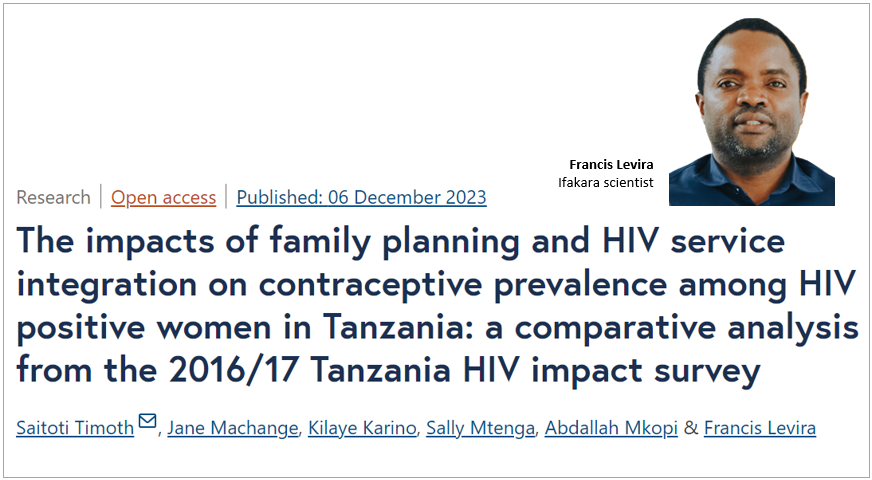
CONCERN: Study finds “lower-than-expected” contraceptive use

A recent study that assessed the impact of integrating HIV and family planning services in Tanzania has revealed lower-than-expected use of birth control methods among HIV-positive women, suggesting a gap in the program's effectiveness.
In Tanzania and across the world, the integration of family planning services with HIV care has been considered a vital strategy in the battle against mother-to-child transmission of HIV and unintended pregnancies.
However, based on these findings, published in the Contraceptive and Reproductive Medicine journal, scientists recommended a thorough evaluation to identify factors constraining or facilitating the program’s success. These recommendations were also shared earlier this year in June during a dissemination meeting with stakeholders in Dodoma and Dar es Salaam.
Learn more about the dissemination meeting here.
Ifakara, NM-AIST leads the study
The study, conducted by Saitoti Timoth from The Nelson Mandela African Institution of Science and Technology (NM-AIST) and Francis Levira from Ifakara Health Institute and colleagues, aimed to evaluate the impact of a service integration by comparing the prevalence of modern contraceptive use among HIV-positive women receiving ART within integrated services and those not on integrated services. The study also included both HIV-negative women and HIV-positive women unaware of their status).
Conducted between 2021 and 2022 in Dodoma and Dar es Salaam cities in Tanzania, the scientists used data from over 30,000 adults aged 15 and above. A total of 14,986 women were included in the analysis, whereby 1,066 were HIV-positive and 13,830 were HIV-negative.
Low contraceptive use in HIV+ women
The prevalence of contraceptive use was only 35% among HIV-positive women and 30% among HIV-negative. However, the findings also showed that awareness of HIV-positive status increased the odds of modern contraceptive use by 33% while being on integrated services increased the odds by 85%.
“This study presents a precise and reliable situation of modern contraceptive use among HIV-positive women and in the general population in Tanzania. Our findings are comparable with studies from sub-Saharan African countries where low modern contraceptive prevalence was observed.”
“Other studies are from Kenya (32%), Northern Uganda 25%, and Ghana 18%, 15%, and 21% in 2003, 2008 and 2014, respectively. Some countries have successfully managed to scale up modern contraceptives to the general population, particularly HIV-positive women.”
Missed variables
While the study presented a clear picture of the situation of modern contraceptive use among HIV-positive women in Tanzania, the scientists also acknowledged certain limitations. They identified some key missing variables, such as family planning knowledge, fertility intentions, male involvement, uptake of family planning counseling, and sources of family planning information, which they had not considered.
Addressing the challenges
In conclusion, the scientists recommend addressing the underlying challenges to improve the effectiveness of the integration program for HIV and family planning services in Tanzania.
They further emphasize the significance of family planning in reducing unintended pregnancies and the transmission of HIV from mother to child, underlining that their findings can provide insights into understanding the persistent challenges of unintended pregnancies and MTCT of HIV in Tanzania.
Contributors
The study was led by Saitoti Timoth from The Nelson Mandela African Institution of Science and Technology (NM-AIST) and Francis Levira from Ifakara Health Institute. Other contributors include Jane Machange from NM-AIST, Kilaye Karino from Kilimanjaro Christian Medical University College (KCMUC), Sally Mtenga, Abdallah Mkopi and Francis Levira – all from Ifakara.
Read the publication here.
